IFHV
The Institute for the International Law of Peace and Armed Conflict
The Institute for the International Law of Peace and Armed Conflict (IFHV) is one of Europe's leading academic institutions to conduct research on humanitarian crises. Coming from a strong tradition of international humanitarian law and human rights law, the institute today combines high-level inter-disciplinary research from the disciplines of public law, social science, geosciences and public health.
We examine the origins of humanitarian crises; the legal parameters before, during and in the aftermath of crises; the effects crises have on people, societies and institutions; and the responses states, international organizations and non-governmental organizations give to crises. We see it as part of our mandate to promote international humanitarian law and the humanitarian principles. We publish our research results regularly inter alia in our bi-lingual and peer-reviewed journals 'Journal of International Law of Peace and Armed Conflict' (JILPAC), 'Journal on International Peace and Organization' (Die Friedens-Warte), and in the 'Journal of Humanitarian Action' (JIHA), in our legal newsletter 'Bofaxe' that also appears at the Voelkerrechtsblog, in our 'IFHV Working Papers', in our book series 'Bochumer Schriften zur Friedenssicherung und zum Humanitären Völkerrrecht' and, together with the Bündnis Entwicklung hilft, in the annual World Risk Report.
Researchers of the IFHV conduct research on the doctoral and the postdoctoral level, are engaged in long-term international research projects and regularly comment on current crises in the public media. You can also follow us on LinkedIn, Facebook and Twitter.
We also contribute to the professionalization of the education of humanitarian aid workers. We need a new generation of committed and professionally trained 'humanitarians', if we want to master the challenges that humanitarian crises pose to us today. For this reason, more than 25 years ago we started to conduct the Network on Humanitarian Action (NOHA) Master in Humanitarian Action. This is a 2 year-long master program during which students receive the basic academic and practical education needed to become a professional humanitarian aid worker. This study program is conducted with more than 20 European and international partner universities and can be considered the leading master program in humanitarian action in Europe, if not in the world. As our newest endeavor, we contribute to life-long learning within our Academy on Humanitarian Action.
We invite you to explore our website and hope we can trigger your interest for the world of humanitarianism.
RUB
Located in the heart of Europe in the dynamic metropolitan region of the Ruhrgebiet, the Ruhr-University Bochum (RUB) with its 21 faculties is home to 42,600 students from over 130 countries.
Founded in 1962 as the first new public university in Germany after World War II, instruction began in 1965. RUB is one of the largest universities in Germany and part of the DeutscheForschungsgemeinschaft (DFG), the most important German research funding organization.
RUB owes its success in research to the close links between the disciplines on campus, which enable it to respond flexibly to current research questions. This approach makes RUB a place of top international research, which is integrated into the worldwide network of the most powerful scientific institutions in its priority areas.
RUB students also benefit from this success in science, as they are involved in research from the very beginning thanks to the principle of research-based learning. Talents can develop here; the RUB makes sure of this with numerous programs that promote individual development at every stage of the career path. This commitment also extends beyond the boundaries of the scientific system: industry and transfer do not remain abstract topics during their studies, but students with an entrepreneurial spirit can try themselves out. Cooperation with industry for mutual benefit strengthens RUB and the region.
Bochum IHL Clinic
The “Bochum International Humanitarian Law Clinic” (Bochum IHL Clinic) is designed to provide students with hands-on experience of the practice of international humanitarian law (IHL). The course empowers students to learn through practical experience by applying theoretical knowledge to real life situations and corresponding legal problems humanitarian actors encounter in their day-to-day work.
They will conduct research on projects for real life cooperation partners, such as the International Committee of the Red Cross (ICRC), national Red Cross Societies, non-governmental organizations (NGOs), government agencies, and other actors in the humanitarian field. This may include the preparation of litigation before national or international courts, writing expert opinions to support NGO lobby work as well as drafting treaty language or legal handbooks for partner institutions. Students may also contribute to supporting victims of armed conflict in securing reparations or file communications to judicial and non-judicial institutions on their behalf.
Participating in clinic work also permits students to acquire and develop skills in research, critical thinking, legal analysis, and problem solving. Additionally, students enhance their abilities to draft texts, give oral presentations, communicate, as well as organize and improve their social skills.
Further, the IHL Clinic Bochum is part of the European Erasmus+ funded project IHL R.E.D., alongside the Universities of Leiden, Glasgow and Roma Tre. At the end of the IHL Clinic Bochum, the students, coordinators/directors and lecturers of all partner universities will visit Bochum for a Clinic Exchange Conference.

